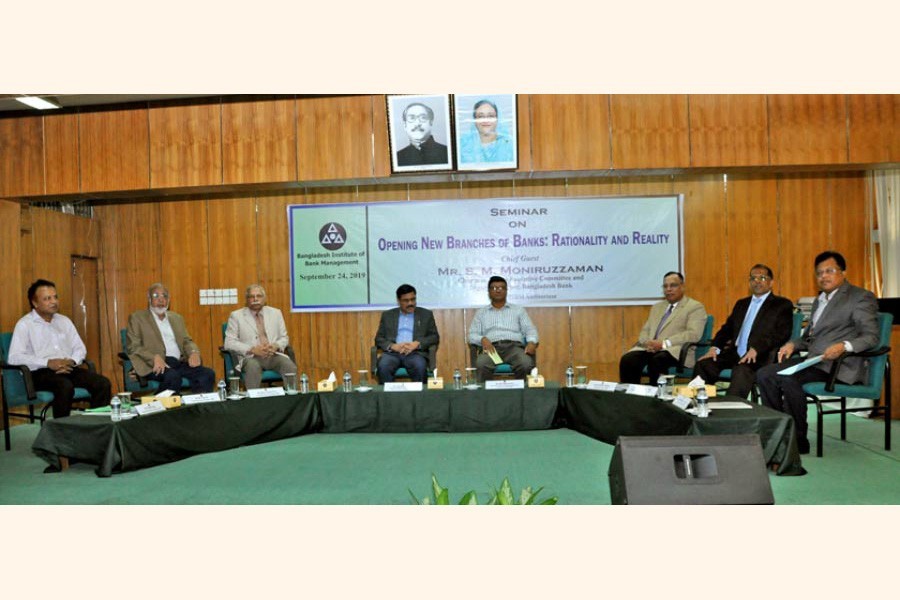Speakers at a programme on Tuesday emphasised opening branches of banks in the country's rural areas judicially and cost-effectively to bring unbanked population into formal banking channel for ensuring financial inclusion and economic development.
They also said high concentration of bank branches may cause an unhealthy competition in the market. So, branches should be set up considering geographical mapping of banking services.
The observations came at a seminar - 'Opening New Branches of Banks: Rationality and Reality', which disseminated the findings of a survey with the same title. A total of 25 banks participated in the survey.
The Bangladesh Institute of Bank Management (BIBM) organised the programme at its auditorium in the capital.
Deputy Governor of the Bangladesh Bank (BB) and the BIBM Executive Committee Chairman S M Moniruzzaman spoke at the programme as the chief guest, with the BB Executive Director and the BIBM Director General Md Nazimuddin in the chair.
Mr Moniruzzaman in his speech said even in the age of advanced technology, the banks depend on their branch network to reach depositors and borrowers, as the network acts as the basic contact point between a bank and its clients.
He noted that at present there are over 10,200 bank branches across the country apart from a large number of ATMs, agent banking points, mobile banking points, and point of sales terminals etc.
Focusing on critically examining and formalising branch opening function of the banks, the BB deputy governor also said the central bank has already undertaken a few initiatives to streamline the process.
The BB wants to ensure a prudent combination of rural and urban branch ratios to promote balanced economic development across the country, Mr Moniruzzaman further said.
"The central bank also regularly instructs the banks to keep the cost of opening their branches or business centres at a low level. If the set-up cost is low, it helps to reach them at break-even point earlier," he added.
Director of the BIBM's Dhaka School of Bank Management Md Mohiuddin Siddique in his keynote paper said in 1998, the state-owned commercial banks (SOCBs) had a total of 3,617 branches, the specialised banks (SBs) had 1,175, the private commercial banks (PCBs) had 1,150, and the foreign commercial banks (FCBs) had 29 branches.
At the end of 2018, the SOCBs, the SBs, the PCBs and the FCBs had 3,746, 1,412, 5,060 and 68 branches respectively.
As of 2018, the PCBs constitute 49.19 per cent of the total bank branches, the SCBs 36.42 per cent, the SBs 13.73 per cent, and the FCBs 0.66 per cent.
In 1998, it was 60.58 per cent for the SCBs, 19.68 per cent for the SBs, 19.26 per cent for the PCBs, and 0.49 for the FCBs.
From 1998 to 2018, the total number of bank branches has increased at a compound annual growth rate (CAGR) of 2.76 per cent. After 2007, the pace of growth took a huge leap, especially in case of the PCBs, which registered a CAGR of 7.69 per cent.
CAGR is the rate of return that would be required for an investment to grow from its beginning balance to its ending balance, assuming the profits were reinvested at the end of each year of the investment's lifespan.
Stating that concentration of bank branches across the country is a common reality, he said, "Initially, it seems that a few branches can survive in a small area. But in the long run it may cause unethical competition."
When concentration of bank branches leads to an unhealthy competition, (opting for) the costly process of branch relocation becomes the only alternative, he opined.
Mr Siddique also said while opening a new branch, the banks face various challenges, like - finding suitable location at reasonable price, lack of adequate leadership, political pressure to open branch, insufficient data on local business and savings, maintaining ratio of urban and rural branches, finding quality borrowers, unstable market, and profit volatility etc.
Speaking at the programme, Dr Muzaffer Ahmad Chair Professor of the BIBM Barkat-e-Khuda said the network of bank branches should be geographically diversified and evenly distributed to provide banking services to all as well as to maintain a healthy competition in the market.
While opening bank branches, the authorities concerned should focus on promoting financial inclusion, reducing rural-urban disparity, and achieving the Sustainable Development Goals (SDGs), he opined.
Considering low profitability, loss or other factors, around 593 branches of 25 banks (that participated in the survey) were relocated in last five years, but none was closed.
It should be analysed why a bank needs to continue the operation of an ailing branch, instead of closing it down, he added.
Mentioning that it is mandatory for a bank (other than the FCBs) to open one rural branch against every new urban branch, representatives of the PCBs urged the regulatory body concerned to revise the proportion to one rural branch against two urban branches.
Supernumerary Professor of the BIBM Helal Ahmed Chowdhury, the BIBM Director (Research, Development & Consultancy) Professor Dr Prashanta Kumar Banerjee, Deputy General Manager of the BB Md Shahriar Siddiqui, Managing Director and CEO of the Rupali Bank Limited Obayed Ullah Al Masud, former Supernumerary Professor of the BIBM Md Yasin Ali, and the University of Dhaka Professor Maksudur Rahman Sarker also spoke at the programme.


